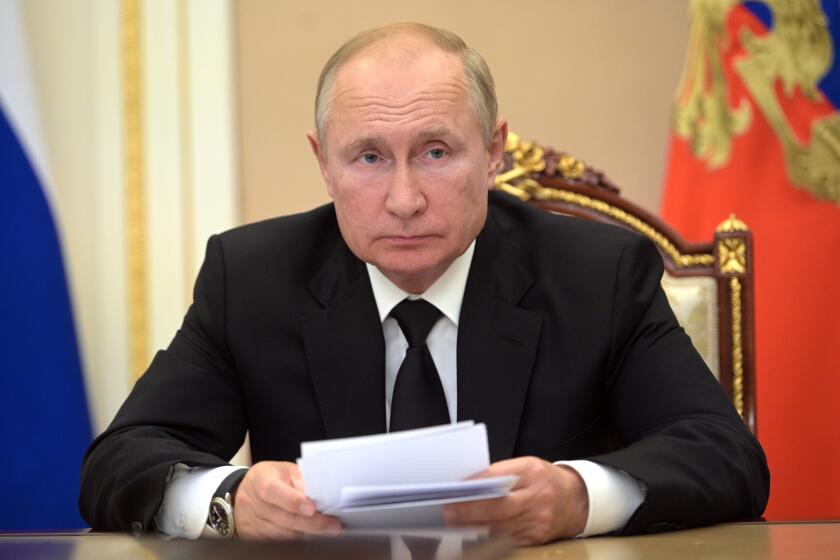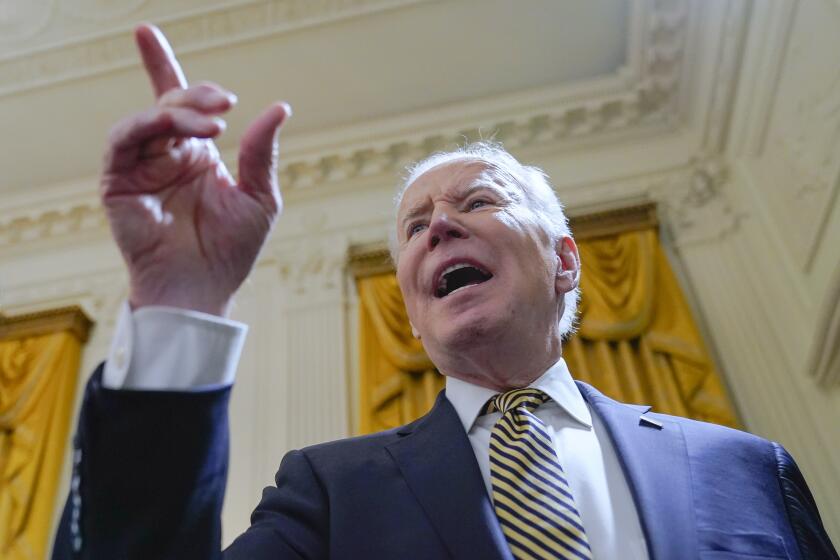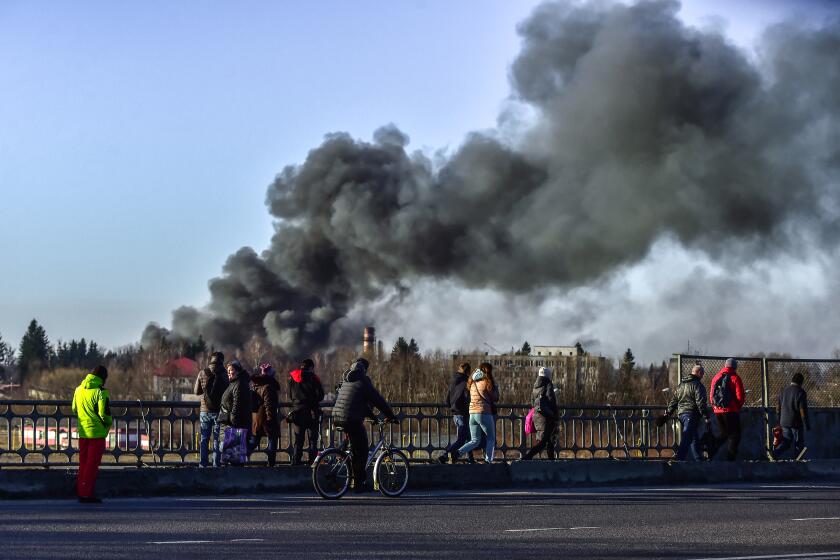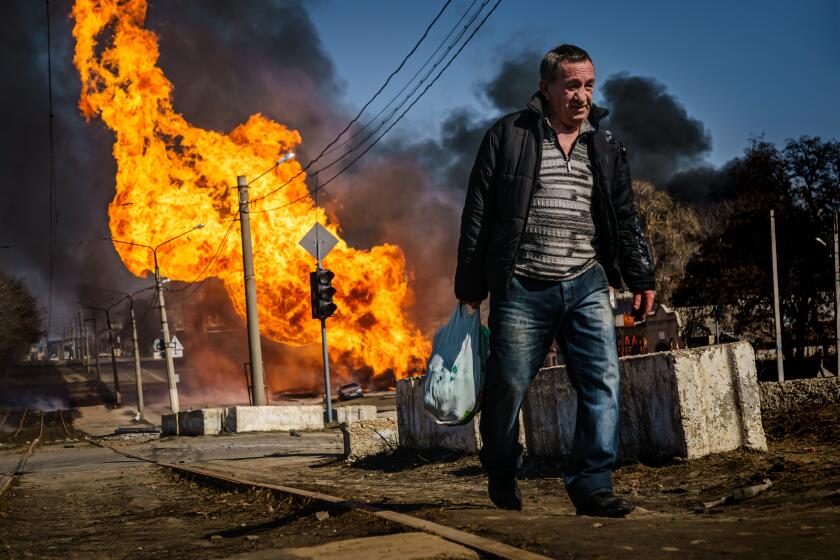Not everyone wants to make Putin an economic pariah over the Ukraine war
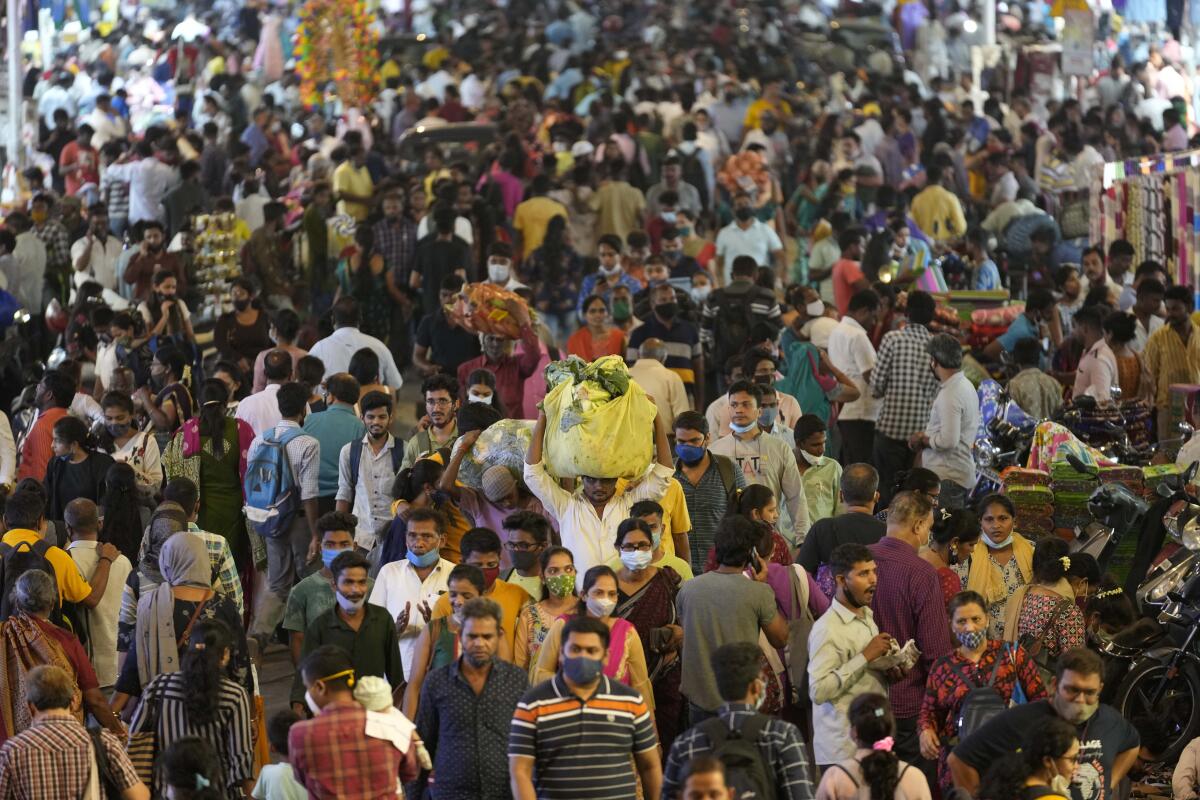
- Share via
Soon after Russia’s army pushed in to try to seize control of Ukraine, Maria Zakharova, the bellicose Foreign Ministry spokeswoman in Moscow, insisted that her country still had plenty of friends in the world.
She mostly meant China, but others too.
“Look at the reaction of world giants — those who are not seeking to present themselves as giants, but who really are giants,” Zakharova said in a prime-time state television interview on Feb. 28, four days after Russian troops commenced a bloody onslaught targeting cities and towns across Ukraine.
Zakharova and her Kremlin associates have spun plenty of false conspiracy theories to justify Russian President Vladimir Putin’s unprovoked attack on a sovereign neighbor. But she was not wrong to suggest that much of the world, at least as measured by population, is unwilling to fully spurn Russia in response to the war in Ukraine.
The United States and its European allies, with the backing of close partners such as Canada, Australia, Japan and South Korea, have imposed harsh sanctions on Russia. Those measures are pummeling the Russian economy, crashing the ruble and driving some of the world’s best-known brands to exit the country.
These companies are staying the course in Russia, to their discredit.
But not everyone is on board with imposing full-on pariah status on Putin.
“Beyond this fortified coalition, very few nations have chosen to take part in the economic warfare set against the Putin government,” David Adler, general coordinator of Progressive International, a group that promotes left-leaning organizations and causes, wrote in a March 10 op-ed in Britain’s Guardian newspaper.
He likened the grouping of countries that want to chart their own course regarding Russia to the Nonaligned Movement that sprang up in the postcolonial 1950s, eschewing allegiance with any major power bloc.
In referring to “world giants” that have chosen to not fully repudiate the Russian leader, Zakharova was principally referring to China, which the Biden administration is trying to dissuade from giving wartime aid to Moscow.
But some of the world’s most populous states — India, Pakistan, Brazil, Indonesia, Bangladesh and Mexico among them — are also signaling a desire to maintain trade ties and other links with Russia while declaring impartiality on the war.
Less than two weeks after Russia invaded Ukraine, the United Nations General Assembly voted overwhelmingly — 141 to 5, with 35 abstentions — to condemn the attack and call on Putin to withdraw his forces. But analysts say that vote, while an important signal of international revulsion over Russia’s attack, does not really serve as a barometer of intent to fully spurn Moscow.
President Biden has flatly called Vladimir Putin a ‘war criminal’ after Russia bombed hospitals and maternity wards in Ukraine.
The four states that directly sided with Russia in voting against the nonbinding U.N. resolution were themselves international outliers: North Korea, Syria, Eritrea and Russia’s ally Belarus. Although the U.S. and its allies portrayed the vote as a stark choice between freedom and repression, the abstainers included India, the world’s largest democracy.
India imports up to 85% of its military equipment from Russia, making it Moscow’s largest arms customer. At the same time, it has drawn closer to the West and its allies as it also seeks to counter Beijing’s reach.
“India is caught in a trap of its own making between Russia and China,” said James Crabtree, executive director of the International Institute for Strategic Studies-Asia, based in Singapore.
“A lot of the weapons that they need to defend themselves against China come from Russia,” he said. “And so you don’t want to get into a situation where you annoy the Russians.”
The war has compelled Indian Prime Minister Narendra Modi to walk a political tightrope. Speaking at a rally this month, he declared India to be “on the side of peace,” friendly with both Russia and Ukraine.
The war also has been awkward for some authoritarian-minded leaders, such as Turkish President Recep Tayyip Erdogan and Hungarian counterpart Viktor Orban, who over the years have cultivated friendly ties with Moscow even though their countries are in the North Atlantic Treaty Organization.
Erdogan, who spoke with Putin only hours before the invasion began, was reported to have felt blindsided by the scale and ferocity of the Russian assault. Turkey has urged a negotiated settlement and last week hosted a round of talks by the Ukrainian and Russian foreign ministers.
Russian missiles hit an aircraft repair facility near Lviv’s airport in Ukraine, bringing the war within miles of the eastern border of NATO.
Orban, for his part, has condemned the Russian invasion and said his government would not veto European Union sanctions. But he also says Hungary is staying out of the fight and will not follow the lead of other European states in providing weapons to Ukraine.
Latin America’s biggest economy, Brazil, isn’t taking sides in the Ukraine war. Shortly before Russia’s invasion, Brazil’s far-right populist president, Jair Bolsonaro, visited Putin and declared himself “in solidarity” with Russia. Now Brazil is striking a studiedly neutral stance, with its foreign minister, Carlos Franca, telling reporters in Lisbon last week that Brazil is “on the side of world peace.”
Ambivalent signals have also come from some countries that count themselves as close U.S. friends, including Israel. Prime Minister Naftali Bennett has sought to play a mediating role between Russia and Ukraine, both of which have had cordial relations with Israel. But critics at home and abroad have faulted Bennett for notably muted criticism of the invasion.
The Muslim world presents yet another set of challenges to the U.S.-European axis arrayed against Putin. The Biden administration has prodded the United Arab Emirates and Saudi Arabia, so far without success, to increase oil production to ease a spike in gas prices stemming in part from the invasion — although, separately, demand has dropped off because of China’s severe coronavirus outbreak.
It has not gone unnoticed in the Arab world that enormous numbers of Ukrainians fleeing the fighting have been warmly welcomed by neighboring European states, a sharp contrast to Poland and Hungary blocking Muslim migrants trying to escape conflicts such as the war in Syria.
Indonesia, the world’s most populous Muslim nation, voted in favor of the U.N. resolution condemning Russia, but analysts said the vote did not reflect complicated attitudes toward both Moscow and the West.
Indonesia, also the largest economy in Southeast Asia, has traditionally remained neutral in global affairs. This year, it has the rotating chairmanship of the Group of 20 major economies, which includes Russia.
In a recent interview with the Japanese financial newspaper Nikkei, Indonesian President Joko “Jokowi” Widodo said that the G-20 was a forum for economic discussions, not political matters.
With analysts pointing to Indonesia’s growing trade relationship with Russia in recent years, Jokowi has avoided admonishing Moscow over the war, saying diplomacy should take precedence over sanctions.
“Indonesia didn’t want to be seen as a Western ally,” said Made Supriatma, an Indonesia expert and a visiting fellow at Singapore’s ISEAS-Yusof Ishak Institute.
A strong strain of anti-Western, pro-Russian sentiment can be seen on social media in Indonesia, according to Radityo Dharmaputra, an Indonesian doctoral candidate in political science at the University of Tartu in Estonia.
The Times’ Marcus Yam, no stranger to war photography, gives a first-person account from Ukraine.
“There’s this narrative in Indonesia that the invasion is the fault of NATO, that it’s the fault of the West, even though the situation is more complicated than that,” said Dharmaputra, who studies Russia’s relationship with Asia.
“It’s partly because the U.S. and Europe have not reached out to the public in developing countries, whereas you can see Russia and China engaging in public diplomacy,” he said. “We’re seeing the cost of that lack of attention now.”
King reported from Washington and Pierson from Singapore.
More to Read
Sign up for Essential California
The most important California stories and recommendations in your inbox every morning.
You may occasionally receive promotional content from the Los Angeles Times.
